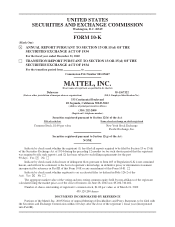Mattel 2002 Annual Report Download - page 19
Download and view the complete annual report
Please find page 19 of the 2002 Mattel annual report below. You can navigate through the pages in the report by either clicking on the pages listed below, or by using the keyword search tool below to find specific information within the annual report.Mattel has a $300.0 million domestic receivables sales facility which is a sub-facility of Mattel’s
$1.060 billion, 3-year domestic unsecured committed revolving credit facility. The outstanding amount of
receivables sold under the domestic receivables facility may not exceed $300.0 million at any given time, and the
$1.060 billion available to be borrowed under the credit facility is reduced to the extent of any such outstanding
receivables sold. Under the domestic receivables facility, certain trade receivables are sold to a group of banks,
which currently include, among others, Bank of America, N.A. as administrative agent, Citicorp USA, Inc. and
Fleet National Bank as syndication agents, and Societe Generale and BNP Paribas as documentation agents.
Pursuant to the domestic receivables facility, Mattel Sales Corp. and Fisher-Price, Inc. (which are wholly-owned
subsidiaries of Mattel) can sell trade receivables from Wal-Mart and Target to Mattel Factoring, Inc. (“Mattel
Factoring”), a Delaware corporation and wholly-owned subsidiary of Mattel. Mattel Factoring is a special
purpose entity whose activities are limited to purchasing and selling receivables under this facility. Mattel
Factoring is a consolidated subsidiary of Mattel. Pursuant to the terms of the domestic receivables facility and
simultaneous with each receivables purchase, Mattel Factoring sells those receivables to the bank group. Mattel
records the transaction, reflecting cash proceeds and sale of accounts receivable on its consolidated balance
sheet, at the time of the sale of the receivables to the bank group.
Mattel’s subsidiaries Mattel International Holdings B.V., a Netherlands company, Mattel France S.A.S., a
French company, and Mattel GmbH, a German company, have entered into a Euro 150 million European trade
receivables facility, pursuant to which Mattel France S.A.S. and Mattel GmbH may sell trade receivables to a
bank, Societe Generale Nederland N.V. The receivables sales are accounted for as a sale. As with the domestic
receivables facility, each sale of accounts receivable is recorded on Mattel’s consolidated balance sheet at the
time of such sale. No Mattel subsidiary is used as a special purpose entity in connection with these transactions.
Under the European receivables facility, the outstanding amount of receivables sold may not exceed Euro
60 million from February 1 through July 31 of each year and may not exceed Euro 150 million at all other times.
Pursuant to a letter agreement between Societe Generale Nederland and Mattel International Holdings B.V.,
Mattel France S.A.S. and Mattel GmbH dated July 1, 2002, the commitment termination date for the European
receivables facility was extended to June 29, 2003.
Government Regulations and Environmental Quality
Mattel’s toy products sold in the US are subject to the provisions of the Consumer Product Safety Act and
the Federal Hazardous Substances Act, and may also be subject to the requirements of the Flammable Fabrics
Act or the Food, Drug and Cosmetics Act, and the regulations promulgated pursuant to such statutes. The
Consumer Product Safety Act and the Federal Hazardous Substances Act enable the Consumer Product Safety
Commission to exclude from the market consumer products that fail to comply with applicable product safety
regulations or otherwise create a substantial risk of injury, as well as articles that contain excessive amounts of a
banned hazardous substance. The Consumer Product Safety Commission may also require the recall and
repurchase or repair by the manufacturer of articles that are banned. Similar laws exist in some states and cities
and in many international markets.
Fisher-Price’s car seats are subject to the provisions of the National Highway Transportation Safety Act,
which enables the National Highway Traffic Safety Administration to promulgate performance standards for
child restraint systems. Fisher-Price conducts periodic tests to ensure that its child restraint systems meet
applicable standards. A Canadian agency, Transport Canada, also regulates child restraint systems sold for use in
Canada. As with the Consumer Product Safety Commission, the National Highway Transportation Safety
Administration and Transport Canada can require the recall and repurchase or repair of products that do not meet
their respective standards. In 2002, Fisher-Price exited the car seat business.
Mattel maintains a quality control program to ensure compliance with various US federal, state and
applicable foreign product safety requirements. Notwithstanding the foregoing, there can be no assurance that all
of Mattel’s products are or will be free from defects or hazard-free. A product recall could have a material
adverse effect on Mattel’s results of operations and financial condition, depending on the product affected by the
10
























